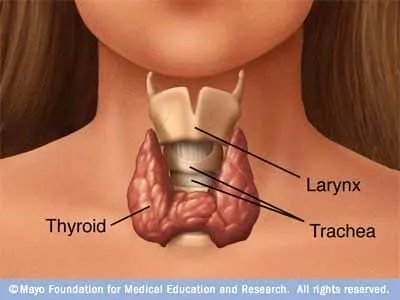
First, Let’s Learn About The Thyroid And How It Works
In healthy people, the thyroid makes just the right amounts of two hormones, T3 (Tri-iodothyronine) and T4 (Thyroxine). T4 is produced in abundance at the thyroid and needs to be converted to the active form (T3) in several other organs and in response to a proper chemical environment. These hormones have important actions throughout the body. Most importantly, they regulate many aspects of our metabolism, affecting how many calories we burn, how warm we feel, how much we weigh…and our general well-being.
Thyroid hormones also have direct effects on most organs, including the heart which beats faster and harder under the influence of increased thyroid hormones (this is why heart problems can often accompany chronic thyroid problems in women, and perhaps why heart problems are more common in women under the age of 50.)
T3 is the more biologically active hormone (it’s more important for cellular function), and in fact most of T4 (80%) is converted to T3 in the body’s peripheral tissues. So T4 is just a precursor for the more active hormone, T3. One of the problems in some thyroid disorders is that you may have trouble converting T4 to T3 in your tissues (have you been checked for this?). This can create a deficiency of T3, disrupting the body’s ability to properly regulate metabolism…leading to specific symptoms.
If you have a problem with any of the important areas for thyroid metabolism then you are going to have difficulty losing weight. Bingo! Has your thyroid function been properly tested?
What Are The Different Types of Thyroid Conditions
And What Are Their Symptoms
Remember that list of symptoms I had you circle earlier in the report, they are the symptoms associated with the 3 primary types of thyroid conditions:
· Hypothyroidism
· Hyperthyroidism or Grave’s Disease
· Hashimoto’s Thyroiditis
Hypothyroidism (Slow Thyroid) is a condition in which the body lacks sufficient thyroid hormones. Since the main purpose of thyroid hormones is to “run the body’s metabolism”, it is logical that people with the condition will have symptoms associated with a slow metabolism. Weight-loss can seem impossible for the sufferer of low thyroid function. Millions of Americans have this more common medical condition…and it often goes undetected in the early stages. Have you been told that your results were “normal” and yet you still continue to suffer with these symptoms?
· Fatigue
· Weight gain, despite adhering to a low-calorie diet, or difficulty losing weight
· Morning headaches that wear off as the day progresses
· Depression
· Constipation (difficult or infrequent bowel movements)
· Hypersensitivity to cold weather
· Poor circulation and numbness in the hands and feet (cold hands and feet)
· Muscles cramps while at rest
· Increased susceptibility to colds and other viral or bacterial infections and difficulty recovering from them
· Slow wound healing
· Excessive amount of sleep required to function properly
· Poor memory
· Chronic digestive problems, such as a lack of stomach acid
· Itchy, dry or course skin
· Dry or brittle hair
· Hair falls out easily
· Carpal Tunnel
· Low auxiliary (body heat) temperature, although this may also be caused by any hormonal imbalance
· Loss of appetite
· Edema especially facial swelling (myxedema)
· Loss of outermost portion of eyebrows
Hyperthyroidism or Grave’s Disease is the medical term to describe an over production of thyroid hormones. Although this condition is less common, it can precede a slowing down of the thyroid. It’s usually easier to manage though. Do you have any of the following symptoms?
· Heat Intolerance
· Diarrhea
· Excessive bowel frequency
· Inward trembling
· Night sweats
· Insomnia
· Feelings of nervousness
· Emotional distress
· Sweaty palms
· Increased pulse rate, even at rest
· Difficulty gaining weight
Hashimoto’s Thyroiditis is a condition in which the body’s immune system attacks the thyroid gland (this is an auto-immune disorder). It is diagnosed by checking for thyroid antibodies (TPO & TGB) and gluten antibodies. Patients suffering from Hashimoto’s Thyroiditis will experience symptoms of both hypothyroidism AND hyperthyroidism, MEANING they will experience some or ALL of the above symptoms.
In short, the thyroid “runs” our metabolism.
It’s literally the “gas pedal” of the body.
Since the thyroid gland controls the body’s metabolism, it can affect all of the systems of the body such as the gut, liver, gall bladder, hormones, cholesterol, brain (via neurotransmitters), adrenal glands, breasts, ovaries, and heart. This is exactly why your thyroid NEEDS to function at its optimal level.
For you, one of the most frustrating symptoms of hypothyroidism is the inability to lose your weight, even though your calorie intake is low and the numbers of hours you’ve logged on the treadmill are high. Hypothyroidism simply slows down the body’s overall metabolism and fat burning. The adrenal hormones, epinephrine and nor-epinephrine, which enhance fat burning lose power when the thyroid is underactive. Low thyroid function makes it harder for the body to burn fat by shutting down the sites on the cells that respond to lipase, an enzyme that metabolizes fat. You also make fat much more quickly than it’s burned, which can drive up your triglycerides, cholesterol, and LDL cholesterol. So not only does stored fat refuse to budge, but the inability to burn the fact for energy also contributes to fatigue and chronic craving for sweet and starchy foods. Lastly, since hypothyroidism hinders human growth hormone, building muscle through exercise is difficult if not impossible and muscle loss can occur.
